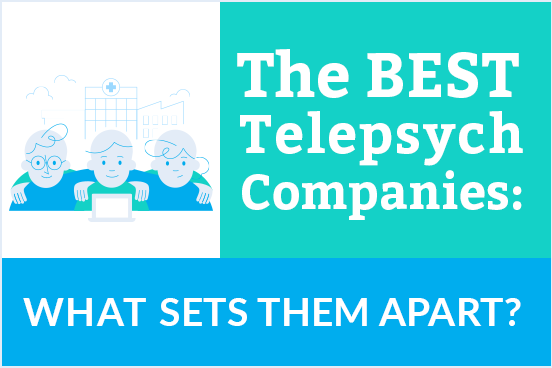
As healthcare facilities across the country work to meet the behavioral health needs of their communities, many are turning to external partners to help them deliver psychiatric care virtually. If your own facility is considering enlisting outside help to implement a telepsychiatry program, selecting the right partner is essential. The best telepsychiatry companies connect your organization with specialized clinicians, ensure a holistic care approach, and advise on best practices to continuously improve your program over time.
Whether facilities are rolling out a telepsychiatry program for the first time or evaluating a new partnership, here are five key questions to consider when choosing a telepsychiatry partner.
1. Do they specialize in telepsychiatry?
Behavioral health is a highly specialized area of healthcare, and telemental health is even more so. An effective telepsychiatry partner should have a proven track record of delivering psychiatric care virtually, including knowledge of clinical and operational best practices, technology requirements, regulatory and compliance matters, and the specific needs facing your patient population.
Ask potential partners about their experience managing the mental health issues facing your patients, such as anxiety and depression, substance abuse, eating disorders, or pediatric psychiatry needs. Also, make sure they have the stability and scale to continue serving you as your needs change over time.
2. Can they match the right psychiatrist to your needs?
Because demand for psychiatric services far outweighs the supply, many recruiters at healthcare organizations struggle to recruit and retain psychiatrists that fit their population’s unique needs. A top telepsych company should have in-depth experience matching high-quality clinicians to address specific issues, from child and geriatric psychiatrists to clinicians with experience in corrections or community health settings. Ask potential partners how they define clinician quality and how they assign their clinicians to facilities based on geography, experience and other factors.
As with all things health-related, time is of the essence when matching clinicians with healthcare organizations. While credentialing can be an involved process, an effective telepsych company should be able to onboard a clinician in no more than four months. Your partner should also support continuity of care by ensuring that patients see the same clinician throughout their treatment during predetermined time blocks, not on an ad-hoc basis. This allows the clinician to build a rapport with patients and to collaborate with on-site clinicians, ultimately supporting better health outcomes.
3. What solutions do they provide beyond clinician placement?
Working with an external telepsychiatry partner should make your job easier, not more complicated. Your partner should manage all employment-related tasks, including malpractice insurance, credentialing and licensing, and hiring new clinicians if needed, all at no additional cost. The right partner goes beyond these tactical items, however, to help the clinician integrate seamlessly into your existing care team and processes. Your on-site staff shouldn’t have to learn a new electronic health record or management procedures; instead, your telepsychiatrist should adapt to your unique workflows.
4. Do they offer technology solutions with additional technical support?
For healthcare facilities that haven’t offered telepsychiatry before, setting up the right technology can seem daunting. In reality, building a high-functioning telepsychiatry tech stack is relatively simple and affordable. A telepsych partner that bundles videoconferencing software and services into one turnkey package can make the process even easier.
Look for a company that provides software specifically designed for virtual psychiatry sessions, ensures HIPAA compliance and offers white-labeled tools to create a seamless patient experience. Once you’re up and running, a partner that provides on-call tech support can help diagnose and resolve any issues quickly to minimize interruptions for clinicians and patients.
5. Are they invested in your ongoing success?
With the right telepsychiatry partner, launching your program should be just the beginning of an ongoing collaboration. The best telepsych companies understand and help you work toward your program objectives and KPIs. An organization with a low attrition rate can also be a key indicator of a company’s ability to retain a clinician that has been matched and deployed within your organization. Low turnover ensures they can provide ongoing care for your patient population. Whether your primary goal is to decrease patient wait time for appointments or reduce avoidable hospital admissions, your partner should draw on proven experience with other facilities to support those goals. A partner with a finger on the pulse of telepsychiatry regulations, compliance and clinical best practices also helps drive continuous improvement in your program.
While an external partner can offer invaluable support in rolling out and running a telepsychiatry program successfully, not all partners are created equal. Knowing what makes a company a good fit for your facility is critical for designing a program with a true impact on your patients’ mental health.
Contact us to see how Regroup can partner with your organization to deliver high-quality behavioral healthcare.
.png?width=170&height=100&name=Array_rgb%20(1).png)
